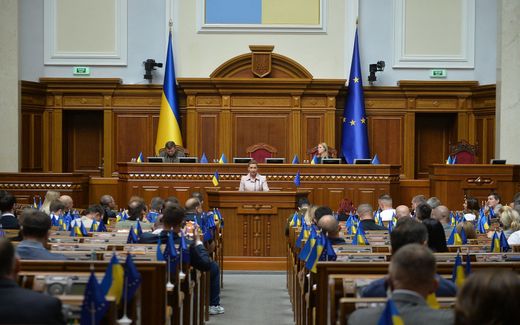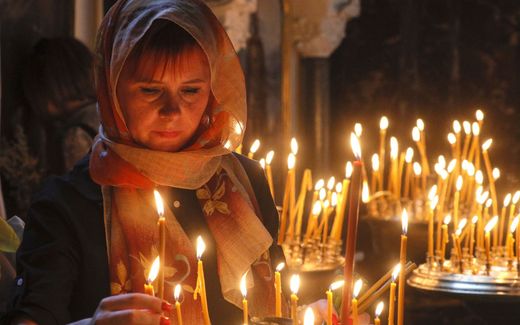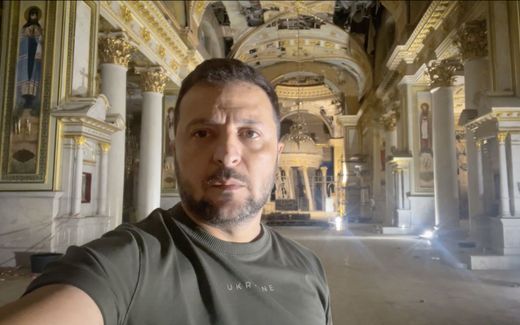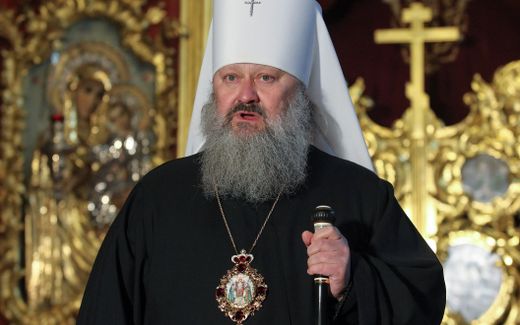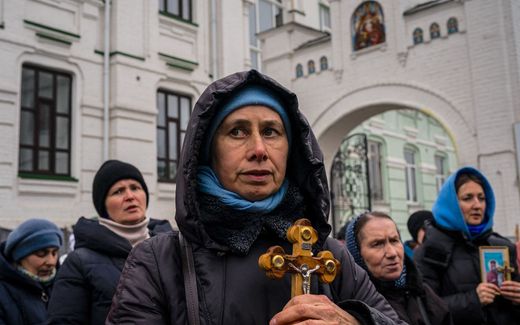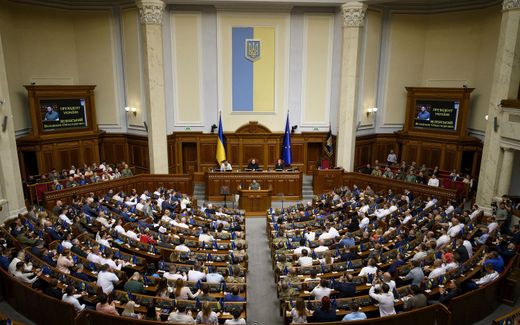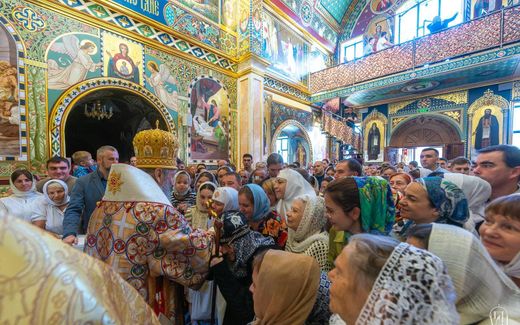Q&A: Does a ban on the Ukrainian Orthodox Church violate religious freedom?
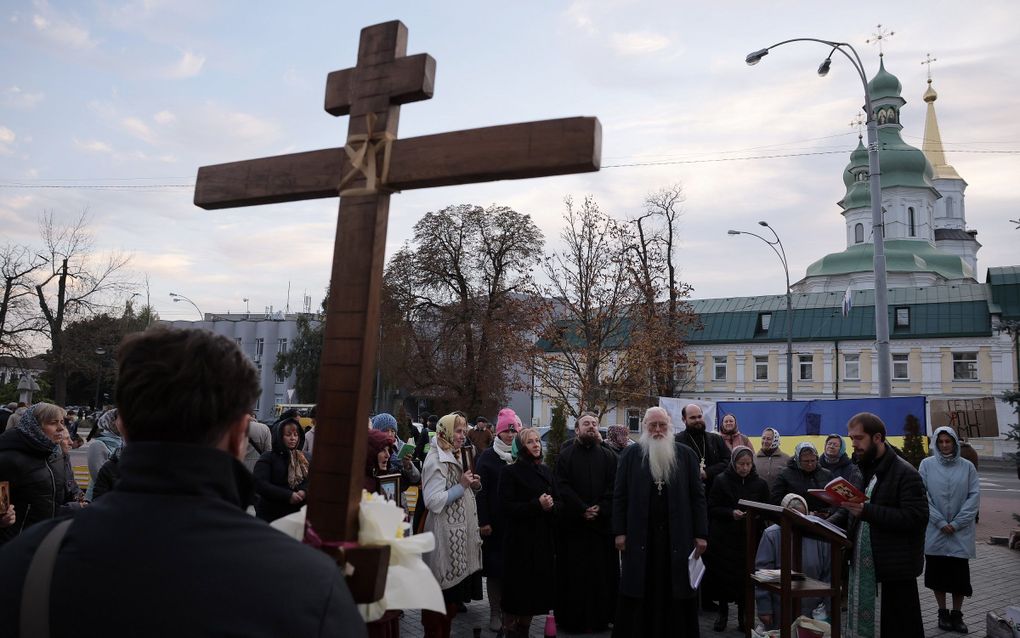
A small group of members of the Ukrainian Orthodox Church (Moscow Patriarchate) gathers for a prayer service outside the Kyiv-Pechersk Lavra monastery in Kyiv (Kiev), Ukraine. The Ukrainian Parliament (Verkhovna Rada) on 19 October passed at first reading a bill on banning the activities of religious organizations associated with the Russian Orthodox Church (ROC) in Ukraine. Photo EPA, Oleg Petrasyuk
Eastern Europe
The Ukrainian Parliament took the first step towards a ban on the Ukrainian Orthodox Church (UOC) last week Thursday. Does this threaten the religious freedom of Ukrainians? Five questions and answers.
What does the decision of the Ukrainian Parliament entail?
While 226 votes were needed to pass the draft of the so-called Bill 8371, 267 deputies voted in favour of restricting the Ukrainian Orthodox Church. If the bill becomes law, the Ukrainian authorities receive more power to terminate the activities of the Church.
For example, the authorised Centre for Countering Russian Propaganda may conduct research to see whether religious organisations cooperate with Russia, Ukrainian's main enemy, Risu.ua writes. In addition, it can order a church to change its activities within a month if they are found to violate Ukrainian law. If a church does not comply with these demands, the Centre can file a lawsuit to ban the Church.
The measure is seen as a means to curtail the UOC. This is the largest religious community in the country.The bill that was passed was the "softest" of the different proposals, BBC writes. And even though the second reading of the document may add more restrictions, these may be voted down, the British broadcaster expects.
The bill does not provide a general and immediate ban on the Ukrainian Orthodox Church. Instead, banning the activities of the UOC is possible but only after a "difficult and lengthy mechanism of movement toward a ban."
BBC points out that the legal process that surrounds a ban on the Church may take years after the law comes into force. The process towards a ban is also difficult because the UOC consists of separate legal unities (the Kyiv Metropolitanate, dioceses and individual parishes) that would need to be banned. In total, there are close to 9,000 units, BBC estimates.

According to the BBC, these restrictions are the "most legitimate judicial way that will not cause sharp condemnation in the West regarding the violation of religious freedom and human rights." In Europe, only courts may decide about the termination of a religious organisation.
Why was this bill tabled?
The Ukrainian Orthodox Church has been controversial since the start of the Russian invasion of Ukraine in February 2022. The head of the Moscow Patriarchate, to which the UOC belongs, has expressed full support for the war.
In reaction, the Ukrainian Orthodox Church attempted to break away from the Moscow Patriarchate. It distanced itself from its mother church and has supported the Ukrainian army since the outbreak of the war. However, officially, the UOC is not in a position to grant itself independence from Moscow. Orthodox Churches need permission from their mother church to get full autocephaly. Thus, the UOC is still connected to the Russian Orthodox Church on paper.
This has led to tensions with the Ukrainian authorities, which distrust the Ukrainian Orthodox Church. President Zelensky and the Security Forces have launched a process to cleanse the Church from "representatives of the Russian world in the UOC", BBC writes. Opinion polls show that most Ukrainians support these efforts.
What will happen to the bill next?
The bill has passed the first reading and must now proceed to the second reading. This is the phase of the legal scrutiny. All parties have the opportunity to submit amendments. BBC expects that many changes will be proposed from both sides. Deputies have at least two weeks to submit their amendments. However, the adoption of the bill as a whole may take much longer. To enter into force, President Zelensky has to sign it as well.

What are the immediate consequences for the churches if the bill comes into effect?
It is possible that the law increases the pressure on the UOC to comply more with the demands of the Ukrainian government, such as the abandonment of the Pechersk Lavra monastery. In addition, the law would legitimise the actions of local authorities against the Church, for example, the seizure of church buildings.
Acting Minister of Culture Rostyslav Karandeev points out that UOC parishes have the right to transfer to their sister denomination, the Orthodox Church of Ukraine, which is independent from the Moscow Patriarchate, SPZH reports. He has signed the proposal for the ban on the Church as well.
Karandeev expects that disputes between the state and the Ukrainian Orthodox Church concerning property will be resolved by the ban as well.
Valery Honcharuk, a political scientist from Ukraine, does not believe that a ban on the UOC will have immediate consequences. "There will be many problems with parishes and property", he pointed out, as reported by Raskolam. Property is often registered to private people, he explains.
In addition, Honcharuk warns that the Ukrainian government cannot take drastic measures against the Church because the West will certainly oppose these. "We have to act according to the law."
What are the reactions to the decision so far?
The leader of the Ukrainian Orthodox Church, Metropolitan Kliment of Nizhyn and Prilutsk, said that the vote on the ban on the Church took place under pressure. Deputies were threatened, he claimed, as reported by Ria Novosti. According to the Church, the bill violates the Constitution of Ukraine and the Human Rights Convention. In addition, Kliment argues that the proposal is part of a set of "anti-Christian bills" that was adopted by the Ukrainian Parliament.
The Ukrainian Orthodox Church has already hired several international law firms to fight for its rights, BBC writes. The Church sees the ban as illegal. Kliment told the British broadcaster that the believers of the UOC are citizens of Ukraine who defend their country from Russia. "Politicians are once again throwing the religious beliefs of millions of Ukrainians at the mercy of their corporate intrigues."
Metropolitan Onuphry says that the UOC will love and pray for all people, even if a ban is implemented. That is reported by SPZH. In his sermon on Sunday, he said that the Church is "not offended by anyone." He emphasised that the Church is not only controlled by a spiritual centre on Earth but also by the one in heaven.
The Ukrainian secretary of the National Security Council, Oleksiy Danilov, does not see the ban as a restriction on religious freedom, Raskolam writes. "We are not talking about the church, but about an institution that directly participates in the war on the side of our enemy, that has a leadership in Moscow which calls to kill our citizens and our children", he said. According to Danilov, people can "talk to God as much as they want", but "spreading and planting institutions that work directly with the centre in Moscow is an unacceptable thing."
Lawyer Nikita Chekman expects many lawsuits if the law comes into force, Ria Novosti reports. Chekman defends the Ukrainian Orthodox Church in its struggle for the Kyiv Pechersk Lavra Monastery. "The clergy and believers of the UOC need to unite and organise systematic and coordinated work for the legal protection of their rights", he added.
Author Yaroslav Nivkin calls the ban a state suicide in an opinion article on SPZH. "Instead of unification and consolidation, the government passes a law that will cause a colossal internal explosion. And not only inside", he writes. Nivkin points out that millions of believers will not accept that "their faith is being taken away from them." And he warns that these people will go into internal opposition. "Banning the Church could become a shameful act of sovereign suicide."
Several Russians have responded to the potential ban on the Ukrainian Orthodox Church as well. Patriarch Kirill writes in a letter to Orthodox Church leaders that this decision "puts the Ukrainian state on a par with the most sinister atheistic regimes of the past", Pravoslavie reports. He called the church leaders to voice support for the UOC.

In addition, he also requested churches and organisations worldwide to speak out against a ban, Ria Novosti writes. A statement of the Department for External Church Relations of the Moscow Patriarchate reads: "I ask you to take all possible measures to prevent the continuation of mass violations of the religious rights of believers of the Ukrainian Orthodox Church, including in the form of discussing the current situation within the framework of the agenda of the organisation you head, preparing specialised reports, as well as sending special missions to establish the facts." According to Kirill, an attack on Russian culture destroys the Ukrainian Orthodox Church, Ria Novosti writes.
The Russian Foreign Ministry calls a ban "arbitrary". The Ministry calls for international condemnation of the legislation, Ria Novosti reports.
The Vice-Speaker of the Russian Duma warned that the ban is an attack on all Orthodoxy. She emphasises that this is only the beginning, Ria Novosti reports. "Lobbyists with the support of the West are seeking a complete ban on Orthodoxy in Ukraine", Anna Kuznetsova wrote on her Telegram channel.
Related Articles


